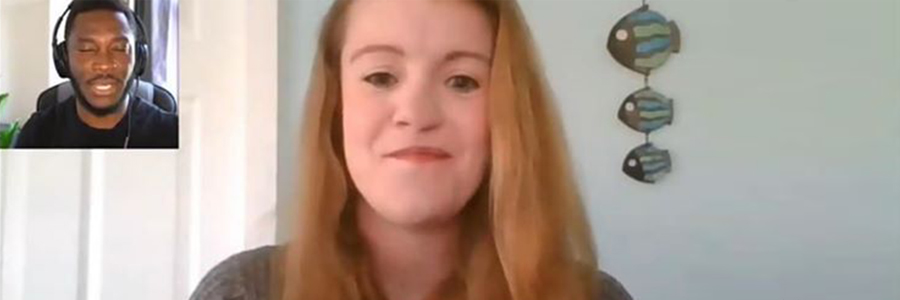‘Wild and Live’: Virtual outreach during lockdown
Posted on
 © Rachel Gunn
© Rachel Gunn
PhD researcher Rachel Gunn, talks about her experience taking part in a YouTube livestream, discussing her research into Butterfly Fish with BBC presenter, Patrick Ayree.
In recent weeks, we have all had to adapt to a new way of living. Universities are closed, conferences are cancelled, and research, degrees and meetings are now all virtual. As a PhD researcher, I spend a lot of time in the field, so being grounded for a while is not something I am used to. Whilst I have finally started to adapt to the necessary changes lockdown has brought about, one thing I have missed is communicating science and my research.
A couple of weeks ago, I had an email from my PhD doctoral training programme, ENVISION. Patrick Ayree, a BBC wildlife presenter, was looking for people to participant in his YouTube series, ‘Wild and Live’. The series consists of 20-minute livestreams with scientists, wildlife filmmakers and conservationists, discussing various aspects of the natural world. My research focusses on how individual butterflyfish changes in response to declining coral cover on reefs, with a focus on aggression. Naturally, I jumped at the opportunity to virtually engage people with my research, talking about ‘feisty fish’ and my love of the ocean!
I have done a fair amount of science communication in the past few years, from academic conferences to speaking in schools both locally, and in the Cayman Islands during my masters when I was working at the Department of Environment researching invasive lionfish. But I had never done anything like a YouTube livestream, so I was excited and nervous to see what it would entail.
I responded to the email about the livestream one morning, expecting to hear back in a few days at the earliest. In fact, I heard back within the hour and spoke with Patrick that afternoon. He put me at ease straight away and wanted to do the livestream within the week. The livestream sessions are aimed at families, and anyone with a general interest in the natural world. The phone call was to learn more about what I do and come up with a broad outline for the session. He asked me questions about my research, but also for some general ‘fun facts’ about butterflyfish, my study species. By the end of the phone call, I was excited to start planning my session.
It was important to me that the session would flow like a conversation, and not come across as a presentation, with some spontaneity in my responses. I had a list of questions from Patrick that he would ask me during the session but I believe that you can overprepare - scripting and practising responses can result in a presentation that is robotic whereas I want to come across as natural, passionate and enthusiastic about my subject. I made some bullet points and did a bit of research just to double check my ‘fun facts’, and that was about the extent of my preparation.
The livestream session was scheduled for 11am on 6 May. From my end, the session was a skype call, with that call then streamed to YouTube. Patrick and I spoke for five minutes beforehand, where he explained how the session would run. Once he introduced me, the session began. Patrick put me at ease straight away and was great at picking up on my answers and, in the end, I felt like I was just having a causal conversation. There were some technical difficulties with the microphone at Patrick’s end, but fortunately I was completely oblivious to that until afterwards.

Rachel speaking live to BBC wildlife presenter Patrick Ayree
Overall, I thoroughly enjoyed the experience, and I hope others enjoyed watching it. It was a great way to engage in scientific outreach during this strange time of lockdown. I would thoroughly recommend the experience to anyone who also wants to get involved with outreach work, particularly if you are not comfortable talking to large groups of people. If you would like to see my livestream or any of the other ‘Wild and Live’ sessions, check out this link.
Rachel Gunn is a second year PhD researcher, focusing on the behavioural responses of reef fish to declining coral cover. She does fieldwork in Indonesia, monitoring and manipulating the behaviour of butterflyfish in areas of high and low coral cover. She is passionate about science communication.
Related Blogs
Disclaimer
The opinions expressed by our bloggers and those providing comments are personal, and may not necessarily reflect the opinions of Lancaster University. Responsibility for the accuracy of any of the information contained within blog posts belongs to the blogger.
Back to blog listing




